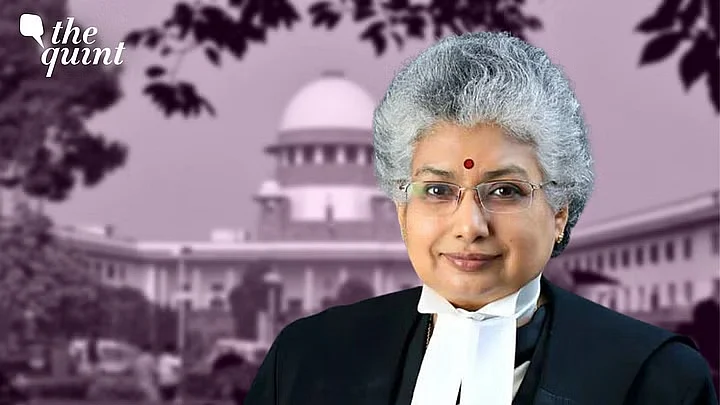"A woman deserves respect howsoever high or low she may otherwise be considered in society or to whatever faith she may follow or whatever creed she may belong to. Can heinous crimes against women permit remission? These are the issue which arise..." read out Justice BV Nagarathna, quashing the Gujarat government's decision to grant remission to 11 convicts in the Bilkis Bano case in August 2022.
The Supreme Court bench led by Justice Nagarathna on Monday, 8 January, observed that the Gujarat government was "complicit" and "acted in tandem" with the convicts in misleading the court by suppressing the facts.
Soon after the verdict, several users took to 'X' (formerly Twitter) to praise Justice Nagarathna – who is likely to go into history books, becoming the first woman Chief Justice of India in 2027 – with many referring to the verdict as a "masterclass" on how judges 'must hold states accountable in a democracy'.
"Justice Nagarathna is showing us what judges can do when they are not pandering to the powers that be and doing temple rounds," an X user wrote.
What Justice Nagarathna Said in Bilkis Bano Verdict
In the verdict, the bench concluded that the Gujarat government had no power to apply its remission policy to the 11 convicts in the case. Rather, the apex court found that it was the Maharashtra government that should have taken a call in the matter as the trial of the case took place there.
"The government of the State where the offender is sentenced is the appropriate government to grant remission, not the government of the state where the offence took place."Justice Nagarathana, as quoted by Live Law.
The apex court slammed the Gujarat government for "usurping" the power of the Maharashtra government in the matter.
The court also found that a May 2022 SC order, which paved the way for the Gujarat government to apply its remission policy, was obtained by "fraud" and was invalid.
“It was the state of Maharashtra who could have only passed the remission orders.. Respondent no 3 (convict) surreptitiously filed the plea before the Supreme Court taking advantage of the May 13 order of this court. Other convicts also filed remission applications and Gujarat govt passed remission orders… Gujarat was complicit and acted in tandem with respondent no 3 (convict) in this case.. This court was misled by suppressing facts. Use of power by Gujarat was only an usurpation of power by the state.”SC verdict on Bilkis Bano case
"Justice encompasses not just the rights of the convicts but also the rights of the victims" and the "primary duty" of the court is to uphold justice and rule of law, Justice Nagarathna said, adding that the "rule of law must be preserved unmindful of the ripples of the consequences."
Run-Up to CJI Post, Justice Nagarathna Makes Her Presence Felt
Justice Nagarathna was enrolled to the Bangalore Bar in 1987 and practised as an advocate dealing with matters pertaining to constitutional law, commercial law, and administrative law. She served as a judge of the Karnataka High Court from 2008 to 2021, before being appointed to the Supreme Court in August 2021.
Unafraid of dissent, undeterred with her views – this is not the first time that Justice Nagarathna, with a career spanning over 35 years, has made her presence felt in the courts.
Most recently, Justice Nagarathna is known for her dissent in two SC cases: the demonetisation verdict and on hate speeches by ministers.
In her first dissent in 2023, Justice Nagarathna declared the November 2016 demonetisation exercise done by the Narendra Modi-led BJP government as well-intentioned but unlawful.
Her judgment was in complete contradiction to the conclusion drawn by the other four judges on the SC bench, who had held the demonetisation exercise to have been valid.
"...on a matter as critical as demonetisation, having a bearing on nearly 86 percent of the total currency in circulation, the same could not have been carried out by way of issuance of an executive notification. A meaningful discussion and debate in the Parliament on the proposed measure would have lent legitimacy to the exercise.”Justice Nagarathna
She had pointed out that the demonetisation of all series of currency notes at the instance of the government is far more serious than that of a particular series by the bank.
'Hate Speeches Strike at Foundational Values'
In the same week, Justice Nagarathna proposed to hold the government vicariously liable for some of the statements that ministers make.
According to her, if a minister indulges in hate speech in his “official capacity,” then such disparaging statements can be vicariously attributed to the government.
“Hate speech strikes at the foundational values of the Constitution by marking out a society as being unequal. It also violates the fraternity of citizens from diverse backgrounds, which is the sine qua non (an essential condition) of a cohesive society based on plurality and multiculturalism such as in India...”Justice Nagarathna
While the demonetisation dissent might be her most prominent judgment so far as a Supreme Court judge, Nagarathna's time at the Karnataka High Court was marked by several notable orders and observations. These included:
(With inputs from Mekhala Saran.)
(At The Quint, we question everything. Play an active role in shaping our journalism by becoming a member today.)
